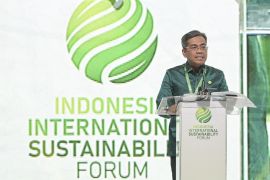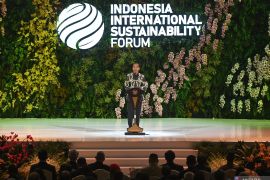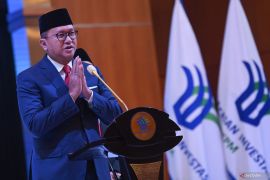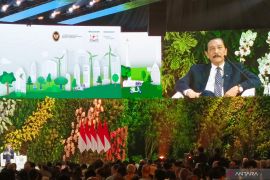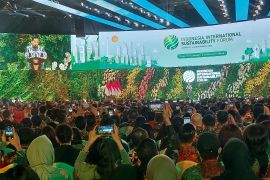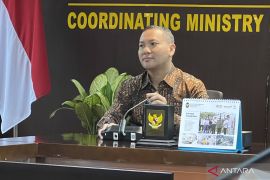Jakarta (ANTARA) - Amid the globalization era and increasingly rapid modernization, the world is currently facing the challenge of climate crisis.
At the Indonesia International Sustainability Forum (IISF) 2024, held in Jakarta on September 5-6, the issue was not only discussed by scientists and environmental activists but became one of the main focuses of world leaders.
The modernization achieved through industrial development over the past century has left a large carbon footprint. Hence, it is appropriate that all levels of global society today begin discussing the balance between economic development and environmental conservation.
Indonesia's important role
Based on Finance Minister Sri Mulyani Indrawati's statement at the plenary session of the ISF 2024, if Indonesia is keen to boost its economy further, it should ensure that the environment remains preserved.
Considering its position as a country with abundant natural resources, Indonesia has a major responsibility in the global efforts to reduce carbon emissions.
Apart from that, Indonesia has some of the biggest tropical forests in the world, especially in the islands of Kalimantan, Sumatra, and Papua.
These forests function as natural carbon absorbers, storing carbon and helping reduce greenhouse gas (GHG) in the atmosphere.
However, high deforestation due to logging, forest fires, and land conversion for palm oil plantations also contributes significantly to increasing global carbon emissions.
Indonesia has set a target of achieving net zero emissions (NZE) by 2060.
An ambitious target has been set of reducing GHG emissions by 31.89 percent with the country's own efforts and by 43.2 percent with international support.
In her speech, the minister stated that the main challenge in achieving the NZE target is financing.
Indeed, large funding is needed to accommodate all sectors to implement the energy transition towards environmentally friendly energy. To this end, green financing plays an important role.
Green financing
Green financing is alternative financing that supports projects that contribute to sustainable development and environmental conservation.
This financing is directed to projects related to renewable energy, energy efficiency, waste management, natural resource management, and climate change mitigation and adaptation efforts.
The aim is to achieve economic growth that is sustainable while maintaining the ecological balance.
For instance, green bonds are a financial instrument often used in green financing in Indonesia, where the proceeds from these bonds are used to finance environmentally friendly projects.
Indrawati noted that government fiscal instruments, such as green and blue bonds, have succeeded in attracting domestic and international investors.
Furthermore, through the Just Energy Transition Partnership (JETP) mechanism launched during the G20 Summit in Bali in 2022, the government is aiming to accelerate energy transition.
Through the JETP, the US International Development Finance Corporation (DFC) agreed on US$1 billion financing for Indonesia for clean energy acceleration.
Among the various green financing instruments, green sukuk can be said to be the most popular in Indonesia.
Indonesia is one of the pioneers in the issuance of green sukuk, which is a Sharia-compliant bond that has drawn the attention of international investors. Green sukuk has recorded high demand, attracting investors from various countries, including Japan and the UK.
Globally, Indonesia has issued green sukuk worth US$5 billion, while for SDGs bond, the value reached €500 million in 2021.
Nevertheless, Indonesia still has a long and challenging way to reach the energy transition target in 2060.
According to the Asian Development Bank (ADB), Indonesia needs US$29.4 billion in green investment until 2030 to reach the NZE target in 2060.
Cross-sectoral collaboration
In the ISF 2024, Finance Minister Sri Mulyani Indrawati highlighted that energy transition cannot only depend on financing from the state budget.
She underscored the need to cooperate with the private sector and invite more non-public funds to participate in green projects.
Through cross-sector collaboration, the government can create policies and incentives that support green projects, while the private sector brings capital and expertise.
This collaboration can cover tax incentives to companies that invest in green projects, such as incentives for the use of renewable energy or electric vehicles.
Subsidies can also be given to support industries that focus on environment-friendly solutions, reducing initial costs that often become a barrier in green projects.
Adaptation
State-run bank PT Bank Mandiri Tbk, one of the biggest financial institutions in Indonesia, also plays an important role in supporting the government's green agenda.
Vice President Director of Bank Mandiri Alexandra Askandar emphasized that collaboration is key to achieving global sustainability.
The state-run bank has facilitated green financing for several large state-owned enterprises, such as state-run electricity company PLN and state-run oil and gas company Pertamina. Apart from that, they also support green infrastructure projects managed by private companies.
The main challenge in green financing is in the early stages of environmental, social, and governance (ESG) adaptation in Indonesia.
Hence, she affirmed that the capacity for development and collaboration with financial institutions that are more advanced in implementing ESG is crucial.
In the last few years, Bank Mandiri has been one of the pioneers in providing green financing to support renewable energy projects.
The company has cooperated with international institutions, such as the ADB, in developing an ESG model that can be implemented locally.
This step is in line with the national strategy to increase the participation of financial institutions in green projects through financial incentives provided by the government.
In this regard, financial institutions have the role of catalysts in the transition towards the green economy.
Askandar emphasized that collaboration with the government, regulators, and international financial institutions is crucial to ensure that all sectors can access green financing.
In the end, sustainability is not only about reducing emissions but also creating new economic opportunities that are inclusive.
Through strong collaboration between the government, private sector, and international financial institutions, Indonesia is determined to be a pioneer in green financing, opening ways for a more sustainable and green future.





